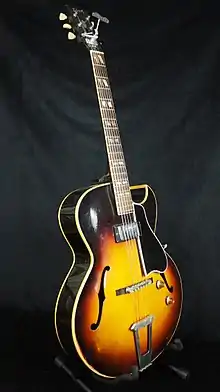Gibson ES-175
The Gibson ES-175 (1949-2019) is a hollow body Jazz electric guitar manufactured by the Gibson Guitar Corporation. The ES-175 became one of Gibson's most popular guitar designs.
| Gibson ES-175 | |
|---|---|
 Herb Ellis's 1953 Gibson ES-175 | |
| Manufacturer | Gibson |
| Period | 1949–2019 |
| Construction | |
| Body type | Hollow |
| Neck joint | Set |
| Woods | |
| Body | Maple laminate |
| Neck | Mahogany |
| Fretboard | Rosewood |
| Hardware | |
| Bridge | Wooden bridge with rosewood base |
| Pickup(s) |
|
| Colors available | |
| |
History

In 1949 the ES-175 was introduced by the Gibson Guitar company. It experienced immediate success and became one of Gibson's most popular guitar designs. In Adrian Ingram's book The Gibson ES175: Its History And Players he states that Gibson sold 37,000 of the guitars in its first fifty years of production. The first ES-175s were released with a sunburst finish and a retail price of $175.[1]
From 1949 to 1953 ES-175s had one P-90 pickup. On July 31, 1953, Gibson released a two pickup version of the ES-175 with a "D" (175D) for double pickup.[2]
Gibson has discontinued this model in 2019.[3]
Specifications
The 175 was designed as a hollowbody electric archtop featuring a single florentine cutaway. The fretboard inlays were double parallelograms and the headstock featured inlays of the Gibson logo and 'crown'. The body was 3.375 in (8.57 cm) and it was 16.25 in (41.3 cm) at the lower bout.[1] The guitar had a maple laminated top back and sides, with a set-neck made of mahogany. The florentine cutaway on the 175 was seen as an improvement over the Venetian cutaway that Gibson had been using on guitars.[4] The cutaway and the amplification of a jazz guitar allowed players to use the uppermost frets on the neck during performances.[5] The 175 had a floating wooden bridge and a trapeze tailpiece.[6]
The first versions had one single-coil P-90 pickup which was set close to the neck: there were two controls for volume and tone. In 1957 the ES-175 was offered with a choice of one or two of Gibson’s new Humbucker pickups.[6] It was the first of Gibson's electric Spanish guitars to be outfitted with Gibson's new PAF humbucker.[7]
Reception
The guitar was one of Gibson's most successful models. The single pickup version was discontinued in 1971, but Gibson continued to produce the 2 pickup version.[8]
Notable players
References
- Brakes, Rod (4 June 2021). "Classic gear: Gibson ES-175". Guitar World. Retrieved 3 December 2022.
- "Gibson ES-175 Chronology". Vintage Guitar and Bass. Vintage Guitar and Bass. Retrieved 3 December 2022.
- "The Gibson ES-175 - more than just a jazz guitar". Adirondack Guitar News. Adirondack Guitar News. Retrieved 17 December 2022.
- "Gibson ES-175D The worlds best known jazz guitar?". Vintage Guitar and Bass. Vintage Guitar and Bass. Retrieved 3 December 2022.
- Bacon, Tony (2011). History of the American guitar : 1833 to the present day (First ed.). Milwaukee, WI: Backbeat. ISBN 9781476856384. Retrieved 3 December 2022.
- Hunter, Dave (9 September 2021). "See a 'Holy Grail' 1959 Gibson ES-175D Up Close". Guitar Player. Retrieved 3 December 2022.
- Duchossoir, A. R. (1994). Gibson electrics : the classic years. Milwaukee, WI: Hal Leonard Corp. pp. 172–174. ISBN 9780793531240.
- Gruhn, George (2010). Electric guitars and basses : a photographic history (Rev. and updated, [2010] ed.). New York: Backbeat Books. pp. 73–74. ISBN 9780879309749. Retrieved 3 December 2022.
- Prown, Pete; Sharken, Lisa (2003). Gear secrets of the guitar legends : how to sound like your favorite players. San Francisco: Backbeat Books. pp. 63–64. ISBN 9780879307516. Retrieved 3 December 2022.
- Holder, Mitch (2006). Jazz Guitar Stylings Of Howard Roberts. Fenton, Missouri: Mel Bay Publications Inc. p. 14. ISBN 9781609745974. Retrieved 3 December 2022.
- Bohlinger, John. "Rig Rundown: Shakey Graves". premierguitar.
Further reading
- Ingram, Adrian (2007). The Gibson 175 : its history and its players. Anaheim Hills, CA: Centerstream Pub. ISBN 9781574242232.
External links
- Official website (archived, 10 Jan 2016)
- History of the Gibson ES-175